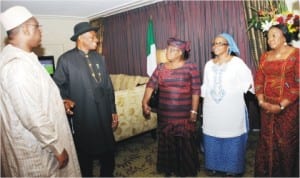Business
PH Traders Want Evacuation Of Trailers
Traders at the popular Creek Road Market, in Port Harcourt have called on the Rivers State Government to relocate trailers which parked on the road, after off loading yams in the area.
A cross section of the traders who spoke to our correspondent at the weekend said the slow pace of work on the road could not be unconnected with the continuous parking of the vehicles on the road even after offloading their goods.
According to the traders, the development has not only impeded trading in the area but has also make the market a no-go area.
For Madam Sarah John-Bull who sells fresh fish in the market, the poor state of the road has forced commercial bus operators to avoid the road thereby depriving traders of customers.
She said moving their articles to the market has been a big problem among as the bus drivers try their best in cutting corners to enable them access the various zones of the market.
Apart from traders some cart pushers who spoke to our correspondent said the poor state of the road was also taking a toll on their operations.
For Monday Ufot, even with the availability of wares, moving them from one point to the other has posed a big challenge.
He said the parked trailers allow him little space to move his wheel barrow thereby making low returns on daily basis.
He as well supported the relocation of the trailers to the outskirts of Port Harcourt in order to expedite action on the Creek Road.
However, some of the Hausa trailer drivers who spoke to our correspondent said they were in support of any move that would help decongest the area.
They said they have so far not seen any serious action for the construction of the road even as they prayed for such.
One of them who gave his name as Mallam Isa admitted the menace of the trailers around the Creek Road Market even as he said they too were worried.
A regular bus driver, Mr Eugene Onyema who had used the route before said the bad state of the Creek Road Market has made drivers cut corners over the years.
He also appealed to the appropriate government agencies to take action save them and the traders of the challenges posed by the ugly development.
However, a visit to the state Ministry of Works by our correspondent to speak with the Hon. Commissioner was not fruitful before going to press but a source said the Creek Road Market was on the programme of the government.

L-R: President Macky Sall Of Senegal; President Goodluck Jonathan; Minister Of Finance, Dr Ngozi Okonjo-iweala; Nigeria’s Ambassador To Senegal, Mrs Katyen Catherine Jackden And The Special Adviser To The President On Nepad, Mrs Fidelia Njeze, During Arrival Of President Jonathan For The Dakar Financing Summit For Africa’s Infrastructure Development In Senegal last Saturday.
Business
Nigeria’s ETF correction deepens as STANBICETF30, VETGRIF30 see 50% decline in a week

Business
BOI Introduces Business Clinic

Business
Dangote signs $400 mln equipment deal with China’s XCMG to speed up refinery expansion

-
Maritime21 hours ago
Customs Declares War Against Narcotics Baron At Idiroko Border
-
Maritime21 hours ago
Nigeria To Pilot Regional Fishing Vessels Register In Gulf Of Guinea —Oyetola
-
Maritime21 hours ago
NIMASA,NAF Boost Unmanned Aerial Surveillance For Maritime Security
-

 Sports21 hours ago
Sports21 hours agoGombe-Gara Rejects Chelle $130,000 monthly salary
-
Maritime21 hours ago
NIWA Collaborates ICPC TO Strengthen Integrity, Revenue
-
City Crime18 hours ago
NCSU Hails Fubara Over 2025 New Telegraph Man Of The Year Award
-
Maritime21 hours ago
NIMASA GETS NEW MARITIME GUARD COMMANDER,ADOKI
-

 Business21 hours ago
Business21 hours agoDangote signs $400 mln equipment deal with China’s XCMG to speed up refinery expansion

